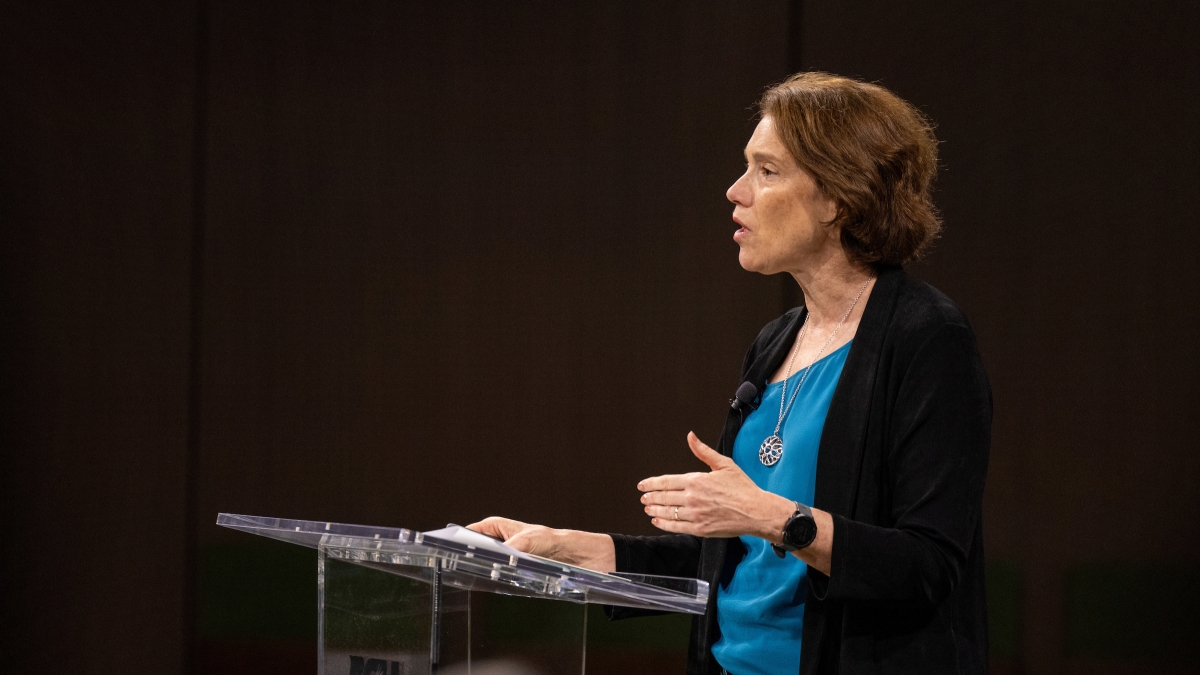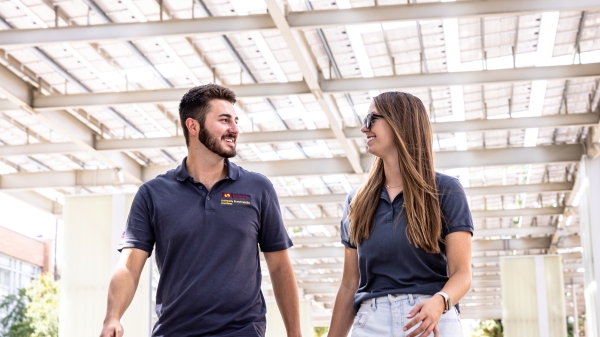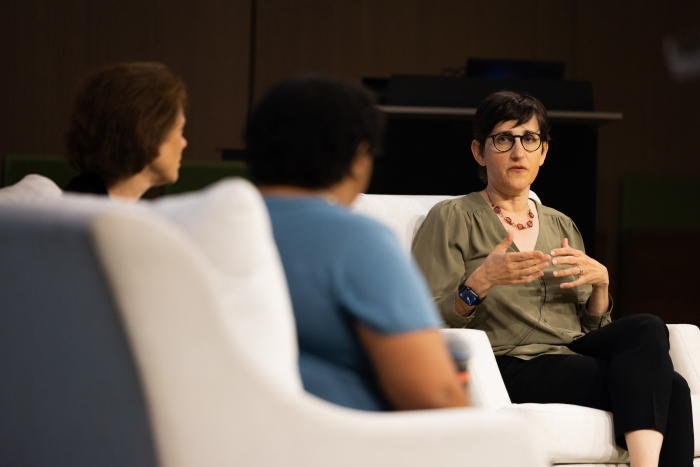Researcher works on changing people's mindsets to fight climate change

Karen O’Brien, professor of sociology and geography at the University of Oslo, was the speaker at the inaugural Elizabeth A. Wentz Graduate College Distinguished Lecture on Wednesday at the Walton Center. Photo by Nathan LeVang/ASU News
Meaningful action to heal the climate requires a complete shift in the way people think and perceive each other, according to an expert on social transformation who spoke at Arizona State University on Wednesday.
Karen O’Brien, professor of sociology and geography at the University of Oslo, was the speaker at the inaugural Elizabeth A. Wentz Graduate College Distinguished Lecture.
People need to move away from an “us versus them” mentality and toward a mindset of shared context and shared meaning with each other, said O’Brien, author of the book "You Matter More Than You Think," which also was the title of her talk. She also is co-founder of the organization cChange, which works on behavioral change initiatives.
“As an academic, I'm thinking, ‘What are the big questions to address?’ And the one that really comes to me first and foremost is, ‘How do we transform?'” she said.
“And what is the relationship between individual change, collective change and systems change?”
O’Brien said that much like the discovery of quantum physics changed the entire way that scientists looked at physics, the emerging field of “quantum social science” is a new paradigm, with concepts such as “entanglement” and interconnectedness and the application of quantum physics models to social problems.
Her project, AdaptationCONNECTS, looks at the conditions and paradigms that can create individual and collective change using creativity, collaboration, empowerment and storytelling.
“So there's this idea that you think, ‘We’re all contributing to these large-scale things,’ but we don't see ourselves as solutions,” she said.
People are stuck in a paradigm that’s “between me and you, between us and other, and between humans and nature,” she said.
“And when you have that separation, it's very easy to not care. So to me, this is at the heart of it — to see how can we shift our patterns of thought and influence how we see systems, how we design systems and also how we engage with systems.”
“Entanglement” applies not just to ourselves and other people, but to the environment as a whole. So when each person sees themselves as part of the whole, even individual actions matter, O’Brien said.
After her lecture, O’Brien joined a Q&A session with Robin Leichenko, a climate change scholar and co-director of the Rutgers Climate Institute.
When asked about engaging with people who don’t want to change, O’Brien said:
“It’s a really important question because you can talk about ‘We’re all one,’ but then you meet that uncle and how do you connect?
“I've had many scientists say, ‘We need to change people's values.’ But have you ever had anyone try to change your values or convince you? You tend to just push back rather than opening up the inquiry like, ‘Why do you think this?’ But it is really challenging.”
Leichenko, who works with cities on developing environmental policies, said that people may be divided on political topics but still can find common ground.
“I try to identify common values. ‘A clean environment’ often works really well — thinking about a better future for people's families,” she said.
“The goal isn't to get into one single way of thinking but to move forward. Are there solutions that might not be perfect for any of five different points of view but can work and can tap into values that are common?”
The lecture was endowed by Elizabeth Wentz, vice provost and dean of the Graduate College and a professor in the School of Geographical Sciences and Urban Planning. She told the crowd that in the past few years, she’s heard more graduate students talk about a new kind of motivation.
“It comes across a little bit like this: ‘I want to solve really big problems and I need the tools I can learn in graduate school to solve those problems,’” Wentz said.
“That answer has been incredibly empowering. We've got major significant challenges locally and nationally and globally, and we need people who are willing to step in and address those problems.”
Wentz said she wanted to share the theme of “You Matter” with her students.
“They might not be the person who actually cures cancer, but they're going to solve a little problem that's going to lead to a solution that is going to incrementally solve these really big challenges.”
More Environment and sustainability

Charles Redman, founder of the School of Sustainability, faces a new adventure: Retirement
At the retirement celebration for Charles Redman on Oct. 22, two messages persisted: Redman’s contributions to Arizona State University helped to shape the interdisciplinary efforts we now find…

10 climate insights to guide our future
A group of globally renowned social, natural and climate scientists has once again convened to offer their newest annual synthesis report, “10 New Insights in Climate Science.”The report, published…

The future is green: Job demand translates to high employability for ASU sustainability grads
A 2023 report by Forbes on the state of green jobs confirmed what Arizona State University has been trumpeting for years: Sustainability will play a large part in the new economy.The report suggests…
